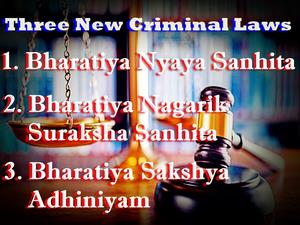
From Colonial To Contemporary: India's Legal System Set To Enter A New Era On Monday
They are set to replace the colonial-era Indian Penal Code, Code of Criminal Procedure, and the Indian Evidence Act, respectively.
The new laws aim to modernise the justice system by introducing features like Zero FIR, online police complaint registration, electronic summonses via SMS, and mandatory videography of crime scenes for all serious offences.
Following the notification of the three new criminal laws on December 25, 2023, the Ministry of Home Affairs (MHA) initiated several preparations to ensure their effective implementation and to raise awareness among all stakeholders, including police, prisons, prosecutors, judicial, forensic personnel, and the general public.
Here are the initiatives undertaken by the MHA to ensure effective and smooth implementation of the new laws.
Twenty-three functional updates were applied to the existing CCTNS (Crime and Criminal Tracking Network and Systems) application to align with the technological requirements of the new criminal laws, including FIR filing.
Technical support was provided to states/Union Territories (UTs) to facilitate a smooth transition to the new system.
Support teams and call centers were established to provide continuous monitoring and assistance to states/UTs in implementing the new criminal laws.
C-DAC (Centre for Development of Advanced Computing) is developing the CCTNS 2.0 application, which will incorporate secure cloud storage and features for crime scene videography and forensic evidence collection.
Significantly, the MHA launched a mobile and web application called NCRB Compendium of Criminal Laws.
It was made available on NCRB, Ministry of Home Affairs, Bureau of Police Research and Development (BPR&D), Sardar Vallabhbhai Patel National Police Academy (SVPNPA), iGot websites, as well as on Google Play Store and iOS.
The e-Sakshaya app was developed that enables videography, photography of crime scenes, and document onboarding.
It has been distributed to all police departments across states and Union Territories, with comprehensive testing completed.
The Nyayashruti App facilitates electronic judicial hearings and document onboarding, shared with all states/UTs and the e-Committee of the Supreme Court for court implementation. The e-Summon App facilitates electronic service of court summonses.
Additionally, necessary updates were made to CCTNS, e-Prison, e-Prosecution, and e-Forensic apps in accordance with the new laws.
The MHA implemented comprehensive training initiatives to build capacity among various stakeholders, including police, prisons, prosecutors, judicial officers, forensic experts, and central police organisations.
Several training modules were developed specifically for capacity building.
Over 250 training courses, webinars, and seminars were conducted, resulting in the training of a large number of officers and personnel.
Control rooms have been established with teams comprising law and police officers to manage and address queries and challenges raised by field personnel during the implementation of the new laws.
Extensive publicity campaigns on social media were carried out.
Ministries published advisories, press releases, and infographics on social media platforms to inform the public about the three new criminal laws.
Dialogue workshops held in state capitals, focused on regional media, to highlight the benefits of implementing the new laws.

Legal Disclaimer:
MENAFN provides the
information “as is” without warranty of any kind. We do not accept
any responsibility or liability for the accuracy, content, images,
videos, licenses, completeness, legality, or reliability of the information
contained in this article. If you have any complaints or copyright
issues related to this article, kindly contact the provider above.


















Comments
No comment